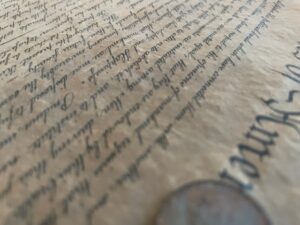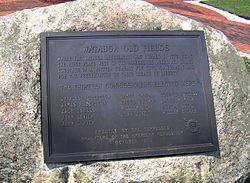Americanism Redux
August 5, 250 years ago today
Lay the paper flat on the table. Hold the edges down. Write the terms of agreement. Sign your name. Change our world.
Today, in Vienna, Joseph II, co-emperor of Austria with his mother, Maria Theresa, announces his written agreement to a plan that divides up the eastern portion of the fledgling nation of Poland. Frederick II, king of Prussia, had seized on the idea of handing out slices of eastern Poland to hungry rivals like Empress Catherine the Great of Russia and the pair of monarchs who ruled the Austrian kingdom. The rulers and their courtly representatives had haggled over details for the past year until, finally, today it’s done. It’s official. Eastern Poland is no more. The people who live there now belong to the Prussian, Russian, or Austrian empires. At some point they’ll likely learn of it from the barrel of a musket, the blade of a sword, the mouth of a cannon.
The blank paper has become a national document of partition.
Today, across the Atlantic Ocean, deep into the interior, among ancient rocky peaks weathered down to the Appalachian Mountains, five men sit at a table and call themselves into “session” as a “court.” A paper-turned-document lays on the table. “The Watauga Compact” is written across the parchment. These five men—John Carter, James Robertson, Charles Robertson, John Brown, and Zachariah Isbell—have formed a community they call a “Republic”, with declared powers of voting, freedom of religion, and governance for the common good. Each man represents a different smaller settlement and has pledged, in writing, to abide by the Compact. The five men know that an additional part of their duty will be to cope with the Watauga Republic’s relations with the nearest Native tribe, the Cherokee, and the nearest British colony, North Carolina. Both the Natives and the colonists will learn of the unique paper-turned-document known as The Compact.
The five men will keep it safe for the next court in session.
They and the rest of the Republic know their success or their failure according to short intervals. For the time being, the best goal is survival for another month, the newest moon that the Natives call “Sturgeon” for the fish that swim in abundance with the trout of Watauga River.
Also
Within six weeks the first reports of the partitioning of Poland will reach newspapers in the British colonies. The reports will exist within other news of large standing armies and navies fielded by European imperial powers. The scale of these forces far overshadow anything in North America. In massive numbers they clash in battle on land and sea. They ravage countrysides and cityscapes. They carry disease and spread destruction. Ordinary people are subject to the effects of decisions made by a tiny set of rulers and their hangers-on.
There is no information about happenings along the Watauga River. Someone may tell someone, who may tell someone, who may write it down. Or not. The impulses for decisions came from within rough-log cabins, lean-to’s made of thick brush and branches, or next to rocks and stones patterned in a circle with ashes or coals in the center. A few people gathered as families or individuals listen to the advice and urgings of a particular person. The same thing repeats three or four more places within a day or two’s or three’s travel. At last, the five particular people who’ve offered the advice and urgings in scattered settings meet together and establish shared ideas and needs. For them and for now, the only thing that matters is the document with “Compact” written across the top.
You Now
The Compact as an original document was lost. The exact wording is gone. The only thing left is a black metal plate set into a rock that nobody reads. The past reclaimed everything else.
I said in my introductory video that I’d visited the National Archives a few years back. The sight of the Declaration of Independence shocked me with its fading words. I shuddered then to think that fading meant dying. This Americanism Redux series is my solo effort to restore the experience of the words before they were written. I won’t let it be lost.
It strikes me now that while actions, like words, have lives of their own, their deaths may follow separate paths. The actions of the Partition writers have existed in different forms at different times among different places for an eternity. You don’t have to look long in 2022 to see it. Actions live as long as words, maybe longer. This fact is why each entry in my Americanism Redux series includes actions as well as words.
Suggestion
Have you tried to get back something you’ve lost? And what if the thing lost is an attitude, an outlook, a spirit and way of seeing life? How should you restore it?









